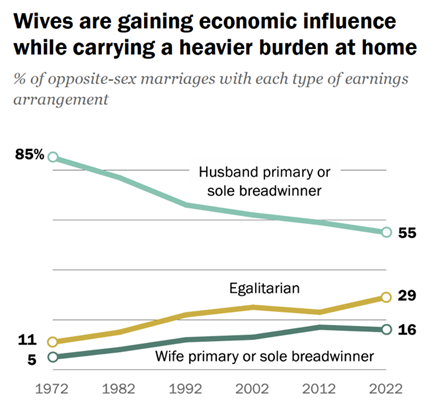 Through many years of research, my colleagues at the Boston College Center for Work & Family and I have developed a portrait of today’s white-collar working fathers – and those who make the choice to be at-home fathers, a choice still relatively rarely rare for American dads. We do this to support fathers who strive to have a balanced life, but also to support gender equality and women’s success in the workplace. In spite of many years of Affirmative Action and organizational efforts to promote women’s advancement, a gap continues to exist when it comes to women’s equality, especially in senior levels of leadership.
Through many years of research, my colleagues at the Boston College Center for Work & Family and I have developed a portrait of today’s white-collar working fathers – and those who make the choice to be at-home fathers, a choice still relatively rarely rare for American dads. We do this to support fathers who strive to have a balanced life, but also to support gender equality and women’s success in the workplace. In spite of many years of Affirmative Action and organizational efforts to promote women’s advancement, a gap continues to exist when it comes to women’s equality, especially in senior levels of leadership.
There’s an old saying that “charity begins at home” and maybe the same holds true for equality. While the government and employers can and should make efforts to level the playing field and advance women in the workplace, much of the reason for workplace disparities is a direct result of the home-based arrangements of working couples. The disparity in time that mothers spend caregiving has been very well documented over the years so this isn’t news. On average, American mothers spend nearly two-times as many hours providing care than working fathers. Yet, in much research, including our own, two-thirds of white-collar fathers say that their goal is to be an egalitarian caregiver. This is especially true for fathers who have a full-time working partner who contributes significantly to the household income. And wives’ financial contributions to family income has continued to increase over the years as the graph below from the Pew Research Center indicates:
 |
||
|
Pew Research Center, 2022 |
But in spite of women’s increased impact on family income, disparities at home and in the workplace continue. Fathers today aspire (and often need) to be much more hands-on with their children than fathers a generation ago. Today’s fathers no longer see their role solely, or even primarily, as a breadwinner. In all of our studies over more than a decade, more than two-thirds of fathers assert that they want to share parenting equally with their spouse / partner. However, half of those fathers (that’s more than one-third of fathers overall) are not living up to that goal. We’ve labeled these men as Conflicted Fathers. The problem with being a conflicted father is that you are not living up to your own standards of parenting and likely letting down your partner as well. And perhaps as a result, these fathers experience lower levels of satisfaction and fulfillment at work and at homewhen compared to fathers who are not in this conflicted state.
So why does this struggle on the homefront continue, with men not living up to their egalitarian ideals? Some would likely assert that it’s due to men continuing to shirk their caregiving responsibilities – and there may be some truth to that. In spite of being the “fatherhood expert” I must admit to a time or two (or more) of letting my wife respond to the kids’ needs that I could just as easily have provided. But there are many other, more valid reasons for this disparity.
In spite of the growing number of households where women are the primary breadwinners, fathers’ financial contributions to the family are typically greater than their partner’s. On average, fathers spend more time at paid work than mothers, partly as a result of the jobs they hold, partly because they are responsible for less on the homefront, and partly a result of the employer's gendered expectations. Organizations have been slow to catch up to and accept men’s important and expanded roles in the home. Until recently, for example, most men were not offered paternity leave by their employers. The resulting lack of time “flying solo” caring for infants leads to lower levels of confidence and competence in caregiving for men while mothers, who often spend several months at home with new children, become solidified in the role of primary caregiver.
This year, we have analyzed a dataset of men and women working in large corporations in the United States. We were curious about what factors facilitated shared caregiving in dual-career couples, and which ones hindered it. Here’s some of what we discovered.
Women whose partners took parental leave are more likely to achieve equality in caregiving. This reinforces, once again, that fathers who have extended periods of time at home with their children in their early days will continue to be more engaged caregivers in the long term. Men who are more likely to achieve egalitarian caregiving arrangements are often those that contribute less than half of the family income and / or have a spouse that works at least 50 hours per week. So to some extent, due to their partners’ higher earnings and long work hours, fathers may be forced into a situation where they achieve their egalitarian ideals.
As stated, our research has shown us that being a Conflicted Father – one who aspires to be an egalitarian caregiver but does not achieve this,– serves no one’s interests, not the father’s, not the mother’s, and not the organizations the fathers work for. So, if you find yourself continuing to come up short on the homefront there are a few things you can do: take parental leave if it’s available, utilize the flexibility you are offered in your role, and be intentional about your commitment to share caregiving equally with your spouse - no matter who earns more or who works longer hours.
How can employers help?
As one can surmise, offering and encouraging fathers to take parental leave and utilizing flexible work arrangements for women and men will help to bridge this divide. And there’s one other important thing. Mothers and fathers who have work roles that are amenable to work-family balance are also more likely to achieve egalitarian caregiving. Striving to create a supportive culture and with enlightened supervisors who understand the work-family challenges caregivers face is important, but it is the role and the time demands it places on working parents that will make the biggest difference.
Father’s Day may be seen as a “Hallmark holiday,” by some, but it does provide an opportunity to reflect on the critical role fathers play in family. Use this upcoming Sunday to ask yourself if your conviction to be a shared caregiver is matched by your day-to-day behaviors. Bringing your actions in line with your aspirations will yield positive outcomes for you and your family. Happy Father’s Day!
_________________________________________________________________________________________
Note: Our research team is working to learn more about fathers in same-sex relationships in a new study we are launching on LGBTQ+ parents. The data we have collected to date represents primarily heterosexual partners (not by exclusion, but due to the very small numbers of LGBTQ+ dads that have responded to our surveys).
Dr. Brad Harrington is the executive director of the Boston College Center for Work & Family and a research professor in the Carroll School of Management at Boston College.

